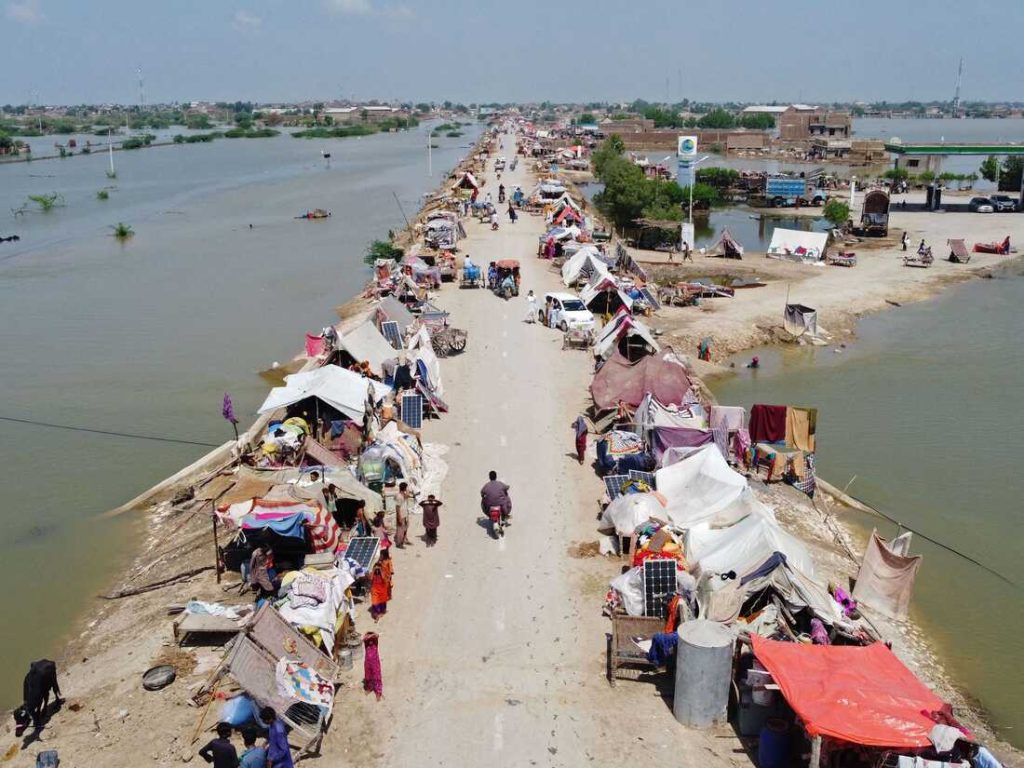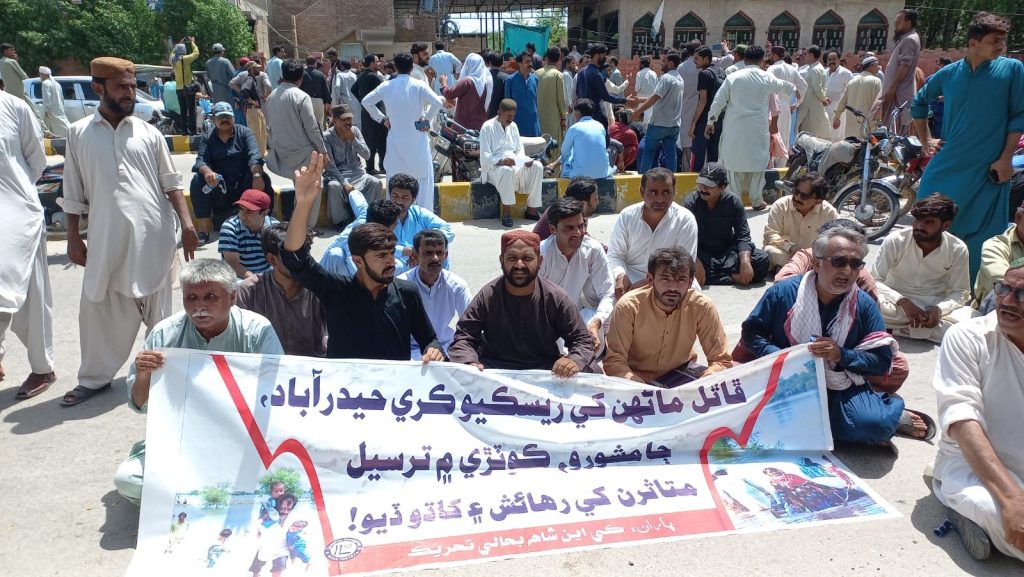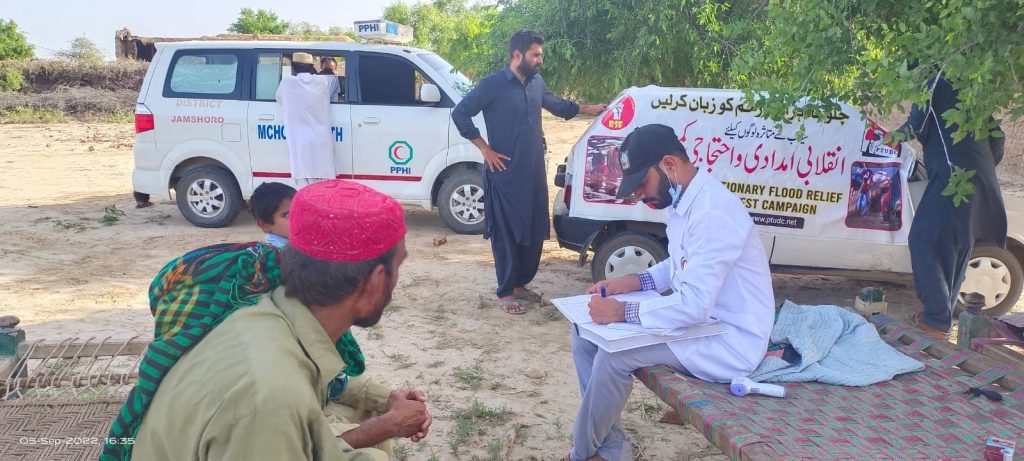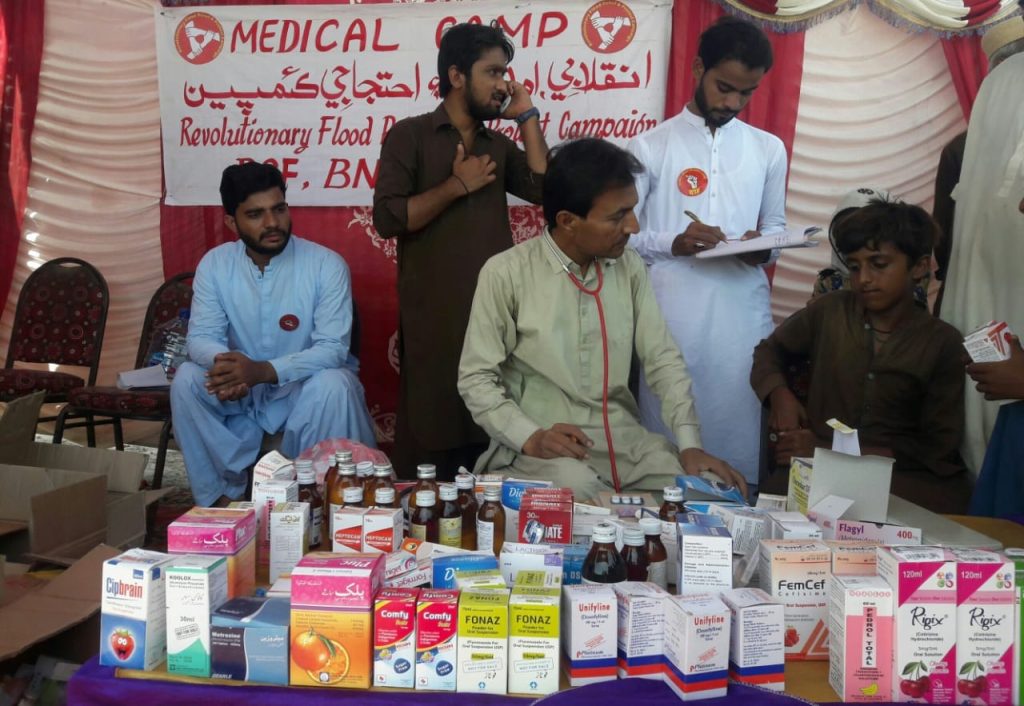Pakistan is experiencing a humanitarian catastrophe. A third of the country has suffered the ravages of a storm that does not stop, and new floods are feared. Millions of people have been affected. The consequences of this disaster strike the poor, above all. The revolutionary organization The Struggle is carrying out a bold campaign of material aid and popular self-organization throughout this immense country. Here, we are publishing the interview of the campaign’s organizer and editor of Asian Marxist Review, Awais Qarni. The interview first appeared on the website of International Socialist League.
Tell us about the current situation and the consequences of the floods in Pakistan.
We must understand that these flash floods are caused by an unusual monsoon spell. Climate change on the global scale is the biggest cause of this heavy rainfall and flooding. In most regions, there was around 5 times more rainfall than normal, especially in Sind and Baluchistan, that wiped out entire villages, towns, and destroyed many lives and crops. According to international and national experts, 33 million people have been affected by these floods, around 15 percent of the population. Climate experts claim that one third of the country is under water now, an area even larger than the state of Victoria. A more than 55000 square kilometer area is flooded, a size that is equal to Costa Rica. So far 1300 to 1500 people have been killed since mid-June, among them more than 400 were children. NASA has captured images and analyzed that 150 bridges have collapsed, bridges that connect the whole country, one town to another, one city to another, even provinces. Roughly 3500 kilometers of the roads have been destroyed. More than 700,000 livestock and two and a half million acres of crops and orchards have been lost. A million houses have already been damaged and many people displaced. During last eight consecutive weeks we have had rainfall. And there was not the infrastructure here to manage all that water and the flooding. There was no planning at all. There was no emergency relief. I have visited one of the most affected areas. It’s called the Fazilpur, in the District Rajanpur of the Saraiki region, southern Punjab. I have seen a whole city, divided by the one national highway that is called the Indus Highway, where the eastern part of the road is somehow safe for now (although alerts have made for that part too), but the western parts have been totally destroyed. All the development that has been made in these 20 or 30 years in terms of houses and businesses and crops has vanished. The people have established tents on the roads, there are heart wrenching stories about the conditions of the people who are living there, on the roads with their families. Some have livestock and children with them. They have no facilities or any rehabilitation process in all those regions. From K.N. Shah of Sindh to Harnai of Baluchistan to Matta of KPK all face a similar situation. The tribes on the Suleiman range, that divides Punjab and Baluchistan, are totally destroyed by these floods. This is the one of the most primitive regions. Most people here depend on livestock. There is no industry or other source for their livelihood. They are basically primitive self-sustaining tribes that have been living there for hundreds of years and have somehow managed. Many of them have not seen even the nearing of a big city. But these floods have caused a very disastrous situation there. In those areas, it’s not just the floods, but in the lowlands the floodwater has also brought tons of mud. There are around 20 villages that cannot be seen because their houses and crops are drowned under 7 to 8 feet of mud. There are pictures on social media that show two story buildings now left with one story; there are very disturbing images of the people who have died there. There is no government institution in the area, there is no city or district level administration, and there is no political or administrative representation in the sites that have been destroyed by the floods. Reports suggest that 110 districts have been affected by these floods. There have been around $10 billion worth of damages, all in that situation. Due to this, there are no vegetables, no grains, no food at all in the flood affected areas. Prices have skyrocketed. Onions that used to be PKR 30 to 50 per kg and now being sold in the flood affected areas at around PKR 500 per kg. Some areas have been disconnected due to the road damages and not a single relief agency has reached there from the government or the administration. But there are a few students who have reached them by crossing the mountains on their bikes, carrying some rations. They used to boil the grains and eat them, but now those resources and stocks are depleting, and they need emergency care. There are no more tents available. There is now a dangerous situation with the mosquitoes, due to the flood water. These flood affected areas are poor towns in southern Punjab, Sind, KPK and Baluchistan. Most of the people work in the fields, there are circles of business on which the whole towns base their political economy. Now, if the crops are affected, it will reflect in the coming days on the whole social life of these towns, and there will be a serious threat in the coming days, even in those areas that have been saved for now. And the other problem is that, apart from all the damages, there is a serious medical condition. Malaria, diarrhea, skin and other diseases are spreading very rapidly, among the children and the women especially. I have read a report that because these are backward areas, and their social circumstances and tribal social norms forbid it, women cannot easily ask for something. BBC reported that women in the flood affected areas who are now on the roads and found shelter are not drinking the quantity of water they need. They are not eating much food. They are rationing it because there are no facilities with toilets, and the women and the girls cannot go openly for that purpose. And that’s causing stomach diseases and constipation. There are also problems with their menstruation cycles. Our friends and university students are focusing on providing, apart from food items, tents and medicines, specifically menstruation and hygiene products to the flood affected areas.
What are the causes of this disaster?
The reasons for this flood situation are quite clear,as long as we understand that global warming is causing unprecedented weather events all around the world. We see wildfires in the Amazon, Australia, and other parts of the world. Just a few weeks ago we had been discussing that there are heatwaves in Britain and on the other side we have flash floods in Pakistan. It is all related to the climate crisis, and the crisis of capitalism. It has been reported that Pakistan is among the top ten countries enormously affected by climate change since 2000. Meanwhile, according to the UN, Pakistan produces only 1 percent of global carbon emissions. Right before the monsoon and this whole flood situation, we have seen heatwaves in Pakistan as well. Temperatures reached around 50 degrees centigrade in certain areas. We have seen 54 degrees recorded in an area which is now one of the most affected by the floods, Dadu, Sindh. Pakistan has around 7000 glaciers that are melting. The country probably has the most glacial ice found outside the polar regions. And climate warming and the recent heatwaves have precipitated several glacial outburst floods in the northern part of the country. The combination of rain and melt water has turned slopes into torrents. Even UN secretary general Antonio in one of his interviews said that we should not sleepwalk into the environmental destruction. But it is quite a reality that all these things are interconnected, and it is the imperialist lust for profits that is now causing the loss of life in Pakistan and elsewhere in the world. There is a report that shows that people living in hotspots like South Asia are 15 times more likely to die from the climate crisis. Moreover, it’s not just global warming; that of course is a reality and an important factor, but countries like Pakistan also doesn’t have any infrastructure to respond to such calamities. The students are being taught that Pakistan has the world’s best canal irrigation system that was built by the British Raj. But now that centuries old system is collapsing; it was neither maintained nor developed. It needs huge reserves of state wealth. The entire infrastructure that was developed during the era of the British Raj is collapsing now. The country’s administration, political parties, and the system itself never respond seriously to these disasters. We have seen the flood disaster in 2010 that affected 20 million people at that time. We have seen the most tragic event in the history of Pakistan, the 2005 earthquake, in Kashmir. Pakistan has not built any infrastructure in all these years. On the contrary, the ruling elite is just plundering the resources. They are basically the stooges of the imperialists and just keep their pockets filled. You can understand the irony that the ex-Prime Minister Imran Khan, of Pakistan Tehreek e Insaf—who is no different and has no less neo-fascist tendencies than Trump, Modi or Bolsonaro—responded in one of his interviews that after these floods, the soil will be more fertile. This logic is inexplicable. It is stupidity on a next level, it’s as if to say that to control the population, you have to wipe out the population. On the other hand, the ruling parties are just doing photo sessions in flood affected areas. Local political representatives are stocking the relief packages in their dens. They are making a mockery out of the miseries of the people. They have not responded to any of the affected areas directly, and they are making international appeals and are receiving hefty amounts of aid from the United Nations, America, China, the UK, and many countries. But as we know, we have no records of the aid that came into Pakistan in 2010 and 2005. And we must understand that 70 percent of Pakistan’s economy is the black [underground] economy. And all these kinds of plunder represent that part of the economy. That economy plays a vast role in politics as well. It is a tragic part of politics, and the masses are turning themselves away from this kind of politics. There is a politically challenged environment in Pakistan. The state institutions are fighting each other, the political parties are fighting each other, and Pakistan is on the verge of economic collapse. During this period, the IMF gave them a bailout package once again, in billions of dollars. So we must understand that the IMF and all the debts they are collecting, they are basically the debt trap we, the working class, are getting into more and more. The shackles of imperialism and capitalism are tightening through these traps. Even the Prime Minister Shahbaz Sharif said in an interview that without the permission of IMF we cannot even sneeze. This shows how helpless they are at the helm of real powers. Capitalism and the decline of capitalism is the major cause of all these disasters. There are many countries in the world where there is much more rainfall per year. It can be planned. Even in a workers’ state calamities can happen but with the planning and thinking about the lives of people over the lust for profit things can be managed with minimum loss. But here, they’ve made dams, and they are all broken now, especially in Baluchistan. The problem is in the system and the handlers of the system. They are so greedy and so ill hearted that they cannot think about the miseries of the common people. Their system only works according to profits and the rate of profits. The system, globally, has outreached its human phase and now it is causing disasters, plunders, and wars. This is the cycle of the capitalism we are now living in, and we must break with the system so that we can build a society that can think about the human needs. There should be priorities during natural disasters that could save the people from them. The reason and the problem are with the system that is based on greed and the exploitation of the general masses.
What program is The Struggle proposing in these circumstances?
In these circumstances, we have launched a campaign and are proposing certain demands through our leaflets and posters. It’s called the “Revolutionary Flood Relief and Protest Campaign”. Obviously, we know that no one can substitute for the state institutions on such a grand scale, so we must put pressure on the state to take a certain amount of responsibility. We are demanding that all government resources be placed on war footing to rescue the people trapped in the floods. The provision of immediate food and medical relief to the flood victims, the government buildings and the other luxury places of the ruling classes must be used to shelter and rehabilitate the homeless flood victims. All flood affected areas must be declared calamity hit, and all their utility bills, taxes and other obligations must be written off, at least for a year. For the students, all fees and other dues for the students from the flood affected areas must be written off immediately. We are demanding that about half a million Pakistani rupees should be granted to the flood affected families and the government must rebuild the houses that have been destroyed in the floods. We cannot leave our people, our class, at the mercy of the capitalists and their system. We are running this campaign, as its name suggests, it’s a relief campaign and protest campaign simultaneously. In the relief campaign, we are providing assistance, especially medical assistance, and for the women hygienic assistance, and dried food rations to the flood affected areas. We have established a series of relief and medical camps in Noorpur, Hajipur and other adjacent areas of Fazilpur, Jamshoro and BhanSyedabad. In the coming days we are going to organize more medical camps in K.N. Shah, Swat and Nowshera and other places that had been affected. We provided ration bags in Dajal, Hajipur, UmerKot and the areas of Kacha. With the medical camps we can help those people in a time of such calamity. But above all those things, we are focusing on building committees of the local people, because many people are sending donations, they have been sending trucks and trucks to the flood affected areas. There have been reports of theft and wastage of food. We are stressing that these relief items should be controlled by the local committees, as the local people know best to whom these things should go, how the excessive food and items should be disbursed and where the medical camp should be held. I have been in Faizarpur, where there has been a lot of relief work by social organizations and kind people are giving donations in those areas. But if you go 15 kilometers away from the main city, you will see no relief packages. And they have been vastly affected in those areas. Similar situations exist elsewhere. Also, these committees must ensure that the government administrative institution should be held responsible and should be pressured to rebuild the roads and bridges and to provide the electricity so the relief campaign can be taken further. These are the committees that we are forming. We have formed committees in Fazilpur, Swat, K.N.Shah, Dadu, Hyderabad, Multan, Lahore, Faisalabad, Karachi, Islamabad, Kashmir and will be forming in the areas of Baluchistan and other flood affected areas. We are inviting other progressive social and political organization to be the part of this campaign. Sojhal Dharti Vaas, a social organization in Fazilpur is doing a tremendous job in the worst hit city in these testing times and they joined this campaign.Similarly we are inviting trade unions and organizations of the working class in this campaign. The Pakistan Trade Union Defense Campaign (PTUDC) and All Pakistan Employees, Labor and Pensioners Movement, that is an alliance of more than 50 trade unions, also supported this initiative. We are inviting progressive student organizations to join it. Revolutionary Students Front, Jammu Kashmir National Students Federation and Unemployed Youth Movement are working with this campaign, and we are inviting others too. We are working on the idea of building a country wide united front through this campaign and its demands. This campaign consisting of the committees have a greater role to play in the days to come. As we have seen, disasters also impact the collective consciousness of the masses of people. The mainstream political party officials are being resisted by the masses; they are not being welcomed in the flood affected areas. And the mockery of the political leaders is being exposed. Currently, the political parties are holding public rallies for their own political sake, while some in the ruling elite are busy simply focusing on photo sessions and looting international aid. And considering the flood damages, shortage of food and skyrocketing inflation, the coming days will be politically charged. Inflation is already around 47 percent, and the floods have destroyed 90 percent of the crops. These committees will build their bases and play an important role. There is a perspective for the mass movement in Pakistan. There is very large polarization in the state and the other institutions, and in politics as well. The conditions the IMF is imposing on Pakistan are worsening, and the government has received a new bailout package that will be a disaster in the coming days. There will be resistance, there will be movements of the masses and working class in Pakistan. The whole region will be affected by this movement. We are focusing on forming these committees with our comrades, our friends, our sympathizers, and the working class itself. They must intervene in the moment and play a decisive role that we have been discussing for decades here in Pakistan. The detailed reports of the Campaign’s activities can be found on the dedicated Facebook page.
What does the campaign that you are carrying out consist of?
As I told you, the campaign is a relief and protest campaign. We are providing relief to the workers, to our comrades, to the committees. We, in parallel, are protesting. We had protests in Dadu, where the landlords tried to cut a bridge so that their fields could be saved and the water could be derailed to the other side. Our comrades and other people resisted. There were women that played a really bold role. They built the blockage all by themselves with sand and soil bags. We also had protested in Hyderabad. In coming days protests will be held in Islamabad and other cities. There are some of the activities mentioned above that we are doing. And most importantly, this campaign is relaunched again. I have referred to the 2010 flood. This campaign was launched in 2010 and played an important role back then. I don’t want to go into the history, but we are doing the same again. We are providing relief, mostly focused on mobile ambulances, so that our comrades and the volunteers can reach far flung areas where there are no hospitals. And we are focusing on the dry food items, items for women and kids especially. Because all this livestock has been drowned, there is an immediate need for the most vulnerable of milk for the children and menstruation kits for the women. With all this, we are campaigning in the universities and in those areas that have not been directly affected, like Peshawar, Islamabad, Lahore, Multan, Karachi and Kashmir. In coming days protest and solidarity campaign would be taken to the cities of Central Punjab. We are already campaigning in the universities and the trade union offices and the industrial areas so that we can build a relation among the working class as a whole. Because there is a burning national question in Pakistan, in Baluchistan, Sind and South Punjab and KPK as well, and these are majorly flooded areas. We are building solidarity among different nationalities and lingual groups. It is important that the solidarity should be expressed from the Punjab working class with the people in Baluchistan, Sindh, KPK and Saraiki region. And also the working class of different nationalities be united on the class solidarity. We are doing this political work and focusing this solidarity campaign on bridging the working class of Pakistan. There will be a gap in the political scenario in coming days that should be filled by the left wing organizations, and our organization that has a legacy of 40 years is very much known by the working class here in Pakistan and the region. We feel it is our responsibility to give them a political program and build solidarity around that political program. We should do further to make working class unity possible as much as we can.
A message for the international solidarity
We’ve appealed to our comrades around the globe, to the International Socialist League and its sections, to Workers International Network, to International Socialism Project, to Socialist Alternative, to Committee for Communist International, to Left Horizons and everywhere around the world, as we are building the solidarity nationally, we request international solidarity for the masses and the working class in Pakistan. As we discussed that it is hit by the global warming, which is just not an issue of Pakistan, but a burning issue that questions the very existence of the human race itself. So we appeal internationally, all comrades, activists, volunteers, militants, to join this fight politically and in every way possible. We need you. The working class of Pakistan needs you. This is a disaster. They need your help and support. They need your financial contributions and donations. They need your political support. They need your solidarity. So we ask the working class of the world, as Marx himself said, Working class of the world unite. Our slogan is the same as our sorrows, An injury to one, is the injury to all. So, we appeal to the comrades from other parts of the world, that we do not consider ourselves alone in this struggle. Our struggle is your struggle and our pain is your pain. Your contribution is very much important and has a high place in our struggle, minds and hearts. And this time we can express solidarity and build solidarity around the different races of the working class and build an organization, build an international that can ultimately fight this unjust system that is causing so much destruction from the Amazon to Argentina and Chile to Lebanon, from the Europe to the Middle East and the Ukraine, from America to Australia and Africa to Asia, everywhere in the world there are destruction. And we can build an International organization that can put an end to all these miseries. Thank you!
Long Live The Struggle!
Long Live Socialism!
 Help the 33 million people devastated by floods in Pakistan…
Help the 33 million people devastated by floods in Pakistan…
DONATE!
(For life-saving drugs, dry foods, drinkable water, tents, hygiene products, milk and biscuits for children)
Campaign Organizer:
Awais Qarni (+92 3338827194)
Bank Al Habib Limited (Fazilpur Branch)
Account Title: Muhammad Awais Qarni
Account Number: 00690081003222016
IBAN: PK38 BAHL 0069008100322201
Swift Code: BAHLPKKAXXX
Easy Paisa/JazzCash: 03338827194
For details regarding the activities of Revolutionary Flood Relief and Protest Campaign please click here or follow our Facebook page: https://www.facebook.com/flood.campaign







